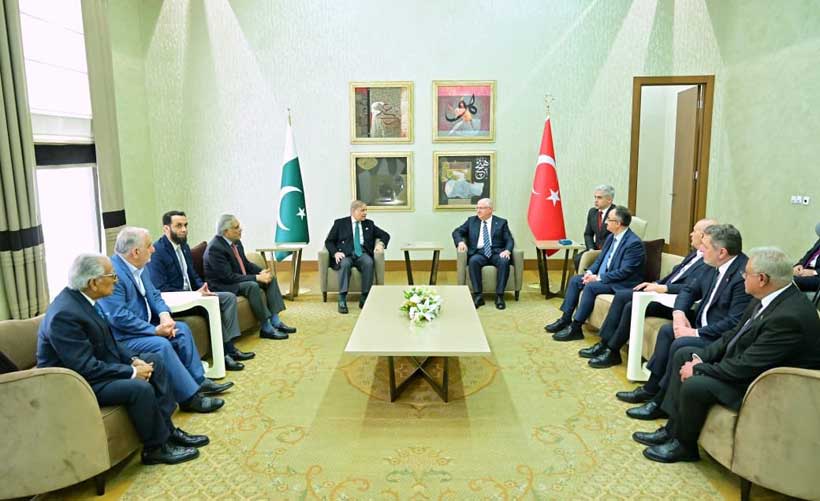The aggravation of relations in South Asia has caused the activation of the policy of military alliances. Turkey has become increasingly active in the region’s geopolitical processes. Ankara is building close military relations with Pakistan.
There are many international agreements between the parties. They regulate various aspects of bilateral relations, ranging from the economy to military and technical issues. Turkey and Pakistan maintain a strategic economic partnership, rooted in shared geopolitical interests, strong bilateral ties, and growing trade and investment links. For example, the Pakistan–Turkey Free Trade Agreement (Preferential Trade Agreement) entered into force in 2023. The agreement regulates trade, investment, and cooperation in the economic sphere. The document reduces duties on 261 tariff lines from Turkey and 130 from Pakistan. Islamabad exports: rice, leather, textiles, and surgical instruments. Turkey exports: machinery, chemicals, textiles, appliances, transport equipment. Target: Boost bilateral trade to $5 billion, and eventually to $10 billion. A Banking and Financial Cooperation Memorandum of Understanding was also signed between the parties regarding the Central Banks of Turkey and Pakistan (2025) to expand monetary cooperation. To date, trade between the parties amounts to approximately $1.3–1.5 billion. At the same time, the parties intend to increase the trade turnover to $5 billion by 2027.
Military cooperation between Turkey and Pakistan is also actively developing. Turkish military experts are helping the Pakistani military improve its army. MILGEM Corvettes: 4 ships jointly produced under $1.5 billion deal. T129 ATAK Helicopters: Pakistan ordered 30 units. JF-17 Aircraft Cooperation: Turkey has shown interest in aerospace collaboration. These contracts drive industrial cooperation, R&D exchange, and employment on both sides. A significant part of the military cooperation is non-public and not disclosed. Deep cooperation exists between special services and military departments. Turkey’s MIT and Pakistan’s ISI are involved in professional data exchange and cooperation. At the end of May 2025, Turkish President Recep Tayyip Erdogan, during talks with Pakistani Prime Minister Shahbaz Sharif, officially and openly stated the importance of intelligence sharing between the countries to combat terrorism.
“Erdogan said that the two countries will work to develop cooperation in all areas, primarily in energy, transport, defense, and strengthening cooperation in education, intelligence sharing and technological support to combat terrorism is beneficial to both countries,” the Turkish leader’s office said. The Turkish leader noted Pakistan’s “principled” position on the situation in Palestine and said that Ankara is working on delivering humanitarian aid to the Gaza Strip as soon as possible. In addition, the parties plan to strengthen cooperation in the economic and trade spheres. “Bilateral relations between Turkey and Pakistan, regional and global issues, were discussed at the talks. President Erdogan announced plans to increase trade turnover between the two countries to $5 billion per year. He also said that the two countries will develop cooperation in all areas, including energy, transport, defense, and the fight against terrorism,” the Turkish president said in a statement.
The escalation of the Indo-Pakistani conflict over Kashmir has shown the depth of relations between Ankara and Islamabad. Turkey almost immediately and without hesitation took a pro-Pakistani position, supporting official Islamabad. Thus, official Ankara did not even offer words of condolence given the terrorist attack in the Indian part of Kashmir, which killed dozens of Hindus. On April 22, Lashkar-e-Taiba terrorists killed 26 Hindu tourists in the town of Pahalgam, in the Indian-administered region of Jammu and Kashmir. India called its military operation Operation Sindoor, a word referring to the red powder that married Hindu women traditionally apply to their faces. The name refers to the women who were left widowed after the Pahalgam attack.
The growing alliance between Turkey and Pakistan could become a major factor in the regional balance. Pakistani Prime Minister Shehbaz Sharif expressed gratitude to Turkey for its “unwavering support” for Kashmir. Immediately after the Pahalgam attack, Turkey reportedly sent a huge amount of military equipment to Pakistan to help Islamabad stockpile against any Indian action. A few Turkish warplanes were reported to have arrived in Pakistan, allegedly carrying Turkish-made weapons and military equipment – reports that were denied by Ankara. Turkey could not deny the presence of its C-130 warplane, as it was detected by global air surveillance systems, but denied that any weapons had been sent.
Pakistan and India have very different military, demographic, and economic potential. In 2024, India’s GDP is $3.9 trillion (nominal) and $13.2 trillion (PPP). GDP per capita (nominal) is $2,800. At the same time, Pakistan’s data is $370 billion (nominal) and $1.6 trillion (PPP). India is recording an annual growth of almost 7%, and Islamabad 2.4%. The main sectors of the Indian economy are related to high technology, IT, pharmaceuticals, finance, the auto industry, and space. At the same time, Pakistan’s economy is agricultural and agrarian: textiles, agriculture, cement, and processing. The demographic potential is also incomparable: India has a population of over 1.4 billion, while Pakistan has 247 million.
Accordingly, Islamabad is forced to seek international support to balance the military and economic imbalance in the conflict with superior India. Erdogan’s Turkey, in turn, is an ideal candidate. The parties have many common parameters in international politics. For example, both Turkish and Pakistani forces have extensive experience in working with and coordinating various radical Islamist groups. Turkey has actively and effectively worked with the Syrian opposition, radical Islamist groups. Pakistan has done similar work with Afghan and Kashmiri radicals. The creation, formation, and coordination of various radical Islamist groups is a method that is actively used by both sides. Thus, one can expect active deepening of relations between Pakistan and Turkey in the future.
